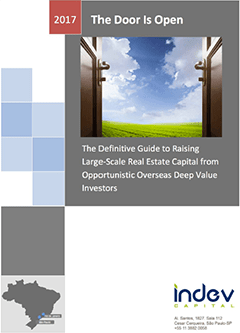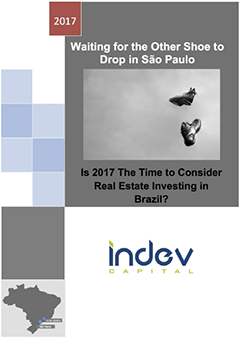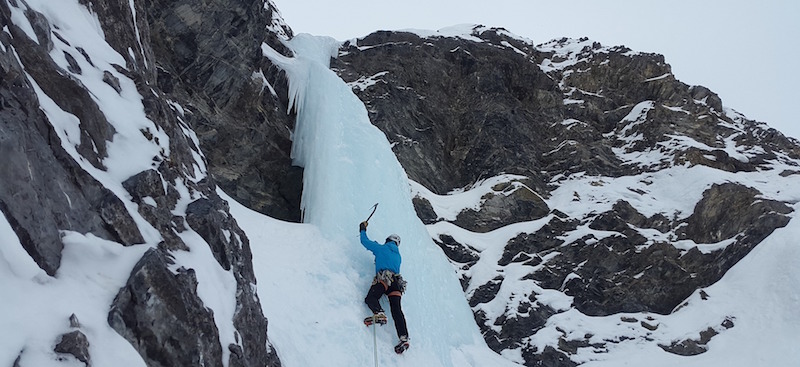
The uncertainty of today’s environment is intense and in many ways is perhaps unprecedented in modern times. Most incredible, besides the obvious serious health concerns, has been the suddenness and the global nature of the economic shock. I sincerely hope that you and yours are weathering the storm. My wife’s aunt in Spain is a recovering patient from the Coronavirus and I have several close friends whose parents are battling the virus. It has affected many in hard, difficult, and sometimes tragic ways.
For organizations, professionals, people, and investors, these are times that unfortunately do occur and seem to happen more often in our now very complex and hyper inter-connected world. As opportunistic investors, when these things happen, we must first make sure that one’s current portfolio investments can weather the storm. Also, and just as importantly, these times of transition, confusion, uncertainty, and (it is okay to say it) fear create new opportunities, a chance to meet new potential partners, and distinct strategies may become even more apparent during this time.
Here at InDev Capital, we have moved in a contrary position and strongly believe, now in fact more than ever, that it is time to engage with our opportunistic investor readers. While we all will likely pause and reflect on much, many of us may have small people pulling on our legs as we work, in addition to exercising caution to help contain the virus, we also owe it to ourselves, our families, our communities, and our nation, and the world to keep executing our craft and do our best to keep the economic engine moving as much as it can.
At InDev, we take this responsibility to keep moving forward quite seriously and will take this moment to interrupt CNN, Fox, MSNBC etc with a business story about opportunistic investing that we hope is interesting and inspires. Thanks for reading, stay safe, wash your hands constantly, and let’s push, pull, scrap, fight, and tough this out together!
Brazil Opportunistic Investing – Ere I Fall Exhausted By the Wayside
Purpose of This Newsletter
It is often said you only know a person when things go wrong.
**As I am sitting here quarantined with my wife and three kids four and under in Barcelona (I bounce back and forth between São Paulo and the coast of Spain these days… or at least I did until I got stuck here), I have learned that I got lucky in my marriage choice, or perhaps no divorce lawyers are working.**
This concept of only understanding someone when things go wrong also applies to us as professionals, organizations, nations, and most salient for our point, opportunistic investors.
The purpose of this newsletter is to share with you a story about an investment that made a ton of sense at the time of investment but circumstances changed drastically. Sound familiar? What were you thinking of 2020 about four to eight weeks ago?
We will provide a brief background of a unique business model in Brazil, which has strong opportunistic characteristics, and then a bit about our protagonist. A perfect storm of bad events made a solid investment an almost certain wipeout. But alas, through attitude, behavior (specific actions), and technique (skill of execution) it did not end in a project-level bankruptcy. The $%&@ did not just hit the fan, it knocked it over and spilled all over the floor.
As economies, businesses, people, individuals, communities, and families go through this uniquely tough period, here is a story of pure perseverance and endurance that turned things around. In candor, the protagonist is one of our favorite people in Brazil (in fact, a person I call OTWGG, One of The World’s Great Guys, made the re-introduction). I hope this story inspires and I hope to see you soon with a strong elbow bump somewhere in the world. Actually, we will start webinars shortly as I doubt you are inviting me in to see you in your offices anytime soon 🙂
Macaé – The Epicenter of Brazil’s Expansion (2000 – 2014)
 Oil was discovered in fields offshore from the state of Rio de Janeiro in the 1970s. Shortly thereafter, Petrobras, the Brazilian public-private oil giant, installed its headquarters for operations in the then small coastal town of Macaé, some 180 kilometers from the capital Rio de Janeiro.
Oil was discovered in fields offshore from the state of Rio de Janeiro in the 1970s. Shortly thereafter, Petrobras, the Brazilian public-private oil giant, installed its headquarters for operations in the then small coastal town of Macaé, some 180 kilometers from the capital Rio de Janeiro.
By 2007, Macaé was positioned to become the home of one of the largest oil extraction operations in the world (responsible for 80% of Brazil’s production), following the discovery of the massive “pre-salt” field stretching the coastline of some five Brazilian states. More than four thousand offshore businesses started operations in the city, including Chevron, Exxon Mobil, Maersk Oil, Shell, and Pacific Drilling; along with significant growth in luxury hotels (like Blue Tree, Sheraton, and Hyatt), restaurants, and the city’s first shopping mall.
Macaé even became home to the state of Rio’s second-largest convention center to host the annual Brazil Offshore annual meeting with over 500 businesses representing 50 countries attending. Between 1997 and 2007 Macaé’s economy grew some 600% and its GDP per capita was 200% greater than the national average. Macaé was even recognized by the think tank Funcação Gertúlo Vargas as the second-best city in the country to work in 2004.
To say things were good would be a huge understatement…
Business Opportunities Abound
One can imagine in this type of business environment opportunities were numerous. In a city of 224,442 people in 2013, and with population growth of 56% between 2000 and 2010 (from 132,461 to 206,748), GDP growth of 600% from 1997 to 2007, and strong employment growth, the need for quality housing was strong. Unlike in urban centers where vertical apartment towers are the norm for housing stock, the housing demand in Macaé was for single-family homes. In Brazil, a single-family home starts with the lot development business and this is where our story begins and ends.
The Lot Business Described
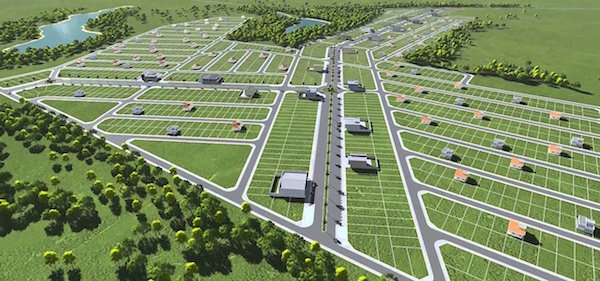 Loteamento is the Brazilian version of the subdivision development. A loteamento is a residential subdivision divided into lots of ready-to-build land without any existing house or structure on them. Buyers purchase the lots and build their own houses.
Loteamento is the Brazilian version of the subdivision development. A loteamento is a residential subdivision divided into lots of ready-to-build land without any existing house or structure on them. Buyers purchase the lots and build their own houses.
In Brazil, a loteamento industry exists for each income segment of the population with lot developers acting as lenders to the lot purchasers. For reasons that we will cover in a forthcoming white paper, there is no bank financing for buyers of lots. Usually the interest rates are approximately 12% per year, plus inflation. The payments are structured to be affordable per month but highly profitable for the developer. It is a great trade!
Urbanization of the Brazilian economy was the main driver of the loteamento expansion beginning in the 1950s. However, in the last 15 years, the sector has developed due to buyer lifestyle desires. An enclosed residential area with a controlled checkpoint, usually a manned gate, with neighbors of the same social and economic level was and is very attractive in Brazil.
As stated, lot developers finance consumers’ purchases of lots for 120 to 180 months. The lot developer’s goal is to pay for the construction/infrastructure of the lots via the payments from purchasers during the first two years. In loteamento launches that sell well, sales revenue in the first two years typically covers 50% of the infrastructure development costs, with the developer covering the remaining 50% of construction costs.
Preparation Meets Opportunity
 Leo, our protagonist, had great experience in real estate. He was the CFO of one the largest listed development companies in Brazil and was the CEO of the second largest lot subdivision company in Brazil that had a famous private equity fund as the main shareholder of the business. He had an ideal background and set of experiences to execute the lot development business in Brazil.
Leo, our protagonist, had great experience in real estate. He was the CFO of one the largest listed development companies in Brazil and was the CEO of the second largest lot subdivision company in Brazil that had a famous private equity fund as the main shareholder of the business. He had an ideal background and set of experiences to execute the lot development business in Brazil.
Leo believed that Macaé was a good place for the lot development business because of the city’s rapid economic growth, employment growth in highly skilled fields, high income jobs, and subsequent employment growth in service, hospitality, entertainment and restaurant sectors due to this increased demand, along with the future investment outlook in the petroleum sector in the area. So, in 2013 he began the process of site selection and started down the long and slow road of approvals processes. Less than two years later, he finally had everything ready to go. At the beginning of 2014 , he launched a 500-lot project and sold some 330 lots in the first two months, which is a huge success in the subdivision business. He expected to sell the remaining lots in five to six months. He perhaps had a high quality beer to celebrate his success, my guess artisanal amber or a wheat beer. Believe it or not, in Brazil, Budweiser is sold as high-end beer. Yes, I too remain shocked by this every day.
Macaé’s economy at the time was booming, driven by the success of Petrobras, the discovery of Brazil’s pre-salt oil reserves, and favorable oil prices, and the underwriting for the lot development looked solid. Based on comparable transactions in the region, the percentage of pre-sales of lots for Leo’s project was above average of other cities in Rio de Janeiro and Brazil. Securing land in Macaé to develop a new project at the time was not easy and prices were above Brazil’s average as well.
Our protagonist Leo found and purchased what seemed to be a perfect site in Macaé. He projected conservative numbers, considered downside protection, and stress tested his model for a much-slower-than-normal sales process. After this rigorous analysis process, the deal still looked good.
A Story of Four Crises – Dominoes Falling… HARD
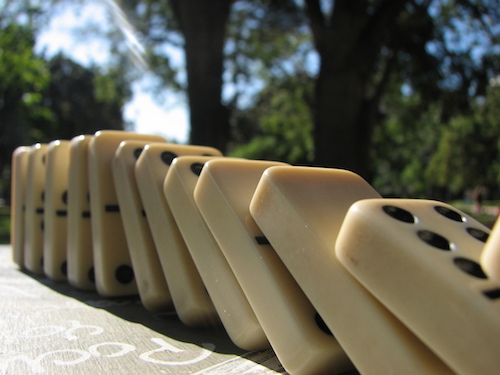 In mid to late 2014, everything began to change. Macaé was at the geographical heart of four interconnected crises: one, Brazil’s 2014 national economic crisis; two, a connected but separate fiscal crisis in the state of Rio de Janeiro; three, falling petroleum prices; and four, a direct massive hit, the Petrobras corruption scandal.
In mid to late 2014, everything began to change. Macaé was at the geographical heart of four interconnected crises: one, Brazil’s 2014 national economic crisis; two, a connected but separate fiscal crisis in the state of Rio de Janeiro; three, falling petroleum prices; and four, a direct massive hit, the Petrobras corruption scandal.
Crisis # 1: Brazil’s National Crisis
Iron ore, petroleum and soy are important commodity exports in the Brazilian economy. In the late 1990 through early 2010s, these commodities experienced significant valuation increase, particularly due to the increased demand from China. But by 2014, China’s economic growth had slowed to 7.3% from previous averages of over 10% a year for three decades, and global commodity prices dropped 38% between June 2014 and February 2015 alone.
Around the same time in Brazil, a decade of economic growth based on macroeconomic policies stimulating consumption and credit expansion (supported by that commodity-based GDP expansion) was showing signs of weakness and unsustainability.
In 2014, as these economic issues were beginning to take hold, the large corruption investigation, Operation Car Wash, was beginning to indict a number of high-profile politicians, as well as executives at large companies, such as the oil company Petrobras.
By the second quarter of 2014, Brazil had entered into a technical recession. In 2015, Brazil’s GDP fell by 3.5% and in 2016 by 3.3%. The economy lost over 1.5 million jobs in 2015 alone. This recession resulted in a fiscal crisis and increasing government budget deficit which grew to 5.8 billion reais in the first three months of 2016 and was the largest since December 2001.
Crisis # 2: Rio de Janeiro’s State Crisis
While nationally Brazil was suffering from the fallout of the corruption investigations and falling soy and iron prices, the state of Rio de Janeiro, where Macaé is located, was bearing the weight of the issues in the petroleum industry. In 2014, petroleum extraction represented 15% of the state’s GDP. Since the national capital moved to Brasilia from Rio de Janeiro in the 1960s, and along with it all of the related jobs and industries, the state of Rio de Janeiro has periodically suffered greatly from a lack of a diversified economy. This first became apparent during the global petroleum crisis of the 1970s, but Rio came back as petroleum prices stabilized and grew, along with its own petroleum industry. Yet, by 2015 this over-reliance on a petroleum-based economy, along with the economic downturn at a national level, combined with fiscal mismanagement at the state government combined to cause a deep fiscal crisis and the need for the state government to renegotiate debts.
The state of Rio was faced with both a significant decrease in receipts and public spending inefficiencies. Between 2014 and 2016, public receipts from petroleum royalties fell by R$4.8 billion, and in 2015 their portion of public receipts fell by about 50%. Three other sectors tied to the petroleum industry (metalworking, petroleum derivatives, and chemical products) also represented about 50% of industrial production at the time. Public spending per capita in 2015 on Legislative and Judiciary functions was about 50% higher in Rio than in São Paulo or Minas Gerais. What were two separate long-term structural issues came together at exactly the wrong time.
** Rio has not had luck with governance, three governors since 1999 have been in jail. I have often thought about having an interview with the three of them and asking, “so when you were running for office, did you think that…” ** By the way, nothing against Rio. Some of my best friends and my CEO coach live there…
Crisis # 3: Petroleum Crisis
On a global scale, between 2014 and 2016 global oil prices dropped by 70% – one of the three largest declines since World War II and the longest since the collapse of 1986. This was largely due to a supply glut in world markets. A number of countries (Brazil and China included) were experiencing economic downturns and decreasing demand for oil (sound familiar?), while countries like the U.S. and Canada had been increasing their own production to counteract the negative impacts of high global prices on their own economies. At the same time, some OPEC member-states kept their production levels stable, since they had a greater ability to withstand price drops, thus further increasing the amount of petroleum in the global market.
Crisis # 4: Petrobras Crisis
In 2014 the Operation Car Wash (Lava Jato) federal investigation was announced. By June 2015, a scheme to defraud Petrobras on pre-salt contracts had been uncovered, in which contracts with the company and a number of suppliers and large construction companies had been inflated in order to benefit executives and high-level politicians. Estimates in 2015 suggested that $17 billion had been lost to mismanagement and graft, and Petrobras would be forced to sell assets and reduce investments by that same value. At the time, the company’s market value had decreased by 50% and it faced $100 billion in debt. In 2013, net profits were a positive R$23 billion, dropping to negative R$23 billion in 2014 and negative R$33 billion in 2015. Employment had also dropped by about 50% in this same period. While Petrobras (including its subsidiaries) ended 2013 with 383,500 employees, by the end of 2016, only 197,100 remained.
Ground Zero: Macaé through the Crises
 Perhaps no other Brazilian city bore the effects of these four crises more acutely than Macaé. Not only did the impacts of the national economic recession and state of Rio fiscal crisis impact the city, like countless others in the state of Rio, but the importance of oil in the local economy exasperated these impacts locally. Petroleum and related industries are central to Macaé, so any movements in oil prices influence local employment, government spending, related services and even the local restaurant, hospitality and entertainment scenes.
Perhaps no other Brazilian city bore the effects of these four crises more acutely than Macaé. Not only did the impacts of the national economic recession and state of Rio fiscal crisis impact the city, like countless others in the state of Rio, but the importance of oil in the local economy exasperated these impacts locally. Petroleum and related industries are central to Macaé, so any movements in oil prices influence local employment, government spending, related services and even the local restaurant, hospitality and entertainment scenes.
As home to Petrobras’ extraction headquarters, the beachfront city of Macaé saw these crises play out significantly. To put this in perspective, between 2014 and 2017, Macaé lost around 30,000 jobs (out of a total population of 244,139 in 2017). In the first five months of 2017 alone, 630 businesses closed in the city. By 2017, Macaé was one of the ten Brazilian cities with the highest job losses, behind only Rio de Janeiro, São Paulo and Porto Alegre in absolute numbers. What once was a shining city on a hill, a model, an up and comer where all systems were go, was now close to being just a lost city.
End of the Road?
The confluence of crises hit Leo’s lot development project hard. The city was devastated. Of Macaé’s residents, 70% were dependent on the oil and gas sector for employment. About 70% of Leo’s lot development clients had at least one family member lose their jobs. Some of them had some savings, others started new businesses, others were relocated, but for the large majority, initially it looked hopeless.
Of the 330 lots Leo had sold, about half were returned to him almost immediately. While 50 were paid off fairly quickly, a modern miracle, the remaining lots were really in a precarious situation. Per the municipality, our protagonist was required to finish the project or lose all the equity, along with his reputation. If he walked away, his business did not have the resources to survive a loss of this magnitude. 
If there is a brick wall in front of you and the enemy approaches, creative juices immediately begin to flow. Importantly, Leo focused on his area of control. He could not control oil prices, nor could he impact Brazil’s economy, and he certainly could not affect corruption at Petrobras. All he could do was to focus on the levers under his control: one, cash in and cash out; two, sales; and three, moving forward with construction (it becomes easier to sell the lot the further along construction is – and he had no choice but to continue per the municipal requirement to deliver the project).
Cash is King, it is also Queen, Prince, and Princess…
Over time, late payment is better than no payment. With 70% of clients losing one job in the family, Leo had to change the game and recognize that keeping a client was the number one priority. Starting over with a new client would have meant not only losing that potential cash, but also incurring an additional marketing expense to source the new client in a market in a tailspin. He opened up an office in Macaé to work directly with his clients and recognized the importance of never stopping communication with them: “Never stop speaking with a client!”
Sales – What Are You Really Selling?
Leo sent his partner to live in Macaé and have extensive conversations with clients one by one, to understand their situations, their needs, and if the lot was really important for them. At the end of the process, Leo’s partner developed a relationship with all of the remaining clients, and sometimes a close relationship with the buyer and his close and extended family members. For those who truly could not pay, Leo had no choice but to repossess the lot.
Clients did not want to lose the money that they had invested thus far in the lot purchase, and they did want to own a home. Leo changed his attitude and realized that he was now beyond selling simply a lot or piece of land for a home, but rather a financial solution, to his customers. While the nature of the business had always meant that he was financing the customer, it was now a different arrangement as he was getting creative to help clients manage their payments and stay owners of the lot.
Obviously flexibility has a limit, but Leo’s preference for flexibility with his clients rather than defaults allowed him to create favorable outcomes for both his business and his clients, considering the circumstances. Leo adopted a policy of friendliness with clients, dealing with them directly and fairly rather than using lawyers as intermediators with clients at risk of defaulting.
Construction
Leo also recognized the importance of never stopping work on construction. With no cash coming in and the market in free fall, construction vendors were nervous as well. Leo was fully transparent. In some cases, he was even able to work out solutions to pay contractors or suppliers in actual lots (parcels of land) rather than direct financial compensation. New housing finance programs from the federal government also emerged, which also aided in finding new sales and repayment methods.
Adding Extra Value
Doing whatever was necessary to add value in a tough market, Leo innovated by developing and selling houses on the site, something rarely done by lot developers in Brazil. This was a way to add a more unique feature and boost sales in a city that was still in its recovery process.
In fact, he not only developed houses but also provided financing for them using Caixa, a local government bank which is the leader in mortgages, another innovation in the subdivision sector.
Managing The Head Game
Of course, these four crises hitting his project simultaneously was a bigger shock than Leo ever could have imagined, leaving him worried, scared, and frustrated. But once the shock wore off, his choice was simple: either give up, stop the development, and try to pay back clients and suppliers, which could lead him to bankruptcy; or try to face the situation, be patient, be transparent with clients and suppliers, and most importantly become very creative to get to the finish line.
Behavior, Attitude, and Technique
I am a deep student of business success (student being the operative word here, not successful yet but that does not stop my aspiration) and particularly of sales and growth strategies. Mark McGraw, a mentor of mine, talks about Behavior, Attitude, Techniques as crucial at all times but particularly in times of crisis. If you ask the average person what is most important in a crisis , they will say that Attitude is most important. Namely, having a positive attitude to get you through tough situations. However, when times are tough, unless you are a psychopath, you will get knocked down some days and have a not so great attitude. When things are bleak, some mornings you will have trouble believing U2’s Beautiful Day.
**I listened to this song and literally bounced around my apartment screaming it every morning from 9/12/2001 to 1/4/2002, when trying to put together US$4M to buy a company with a sectionmate from HBS to execute a leveraged buyout of my first company after 9/11, by the way. I do not think I am a psychopath, but I am positive that anyone that saw me blasting U2’s “Beautiful Day” during those days while bouncing around my apartment in Sandy Springs would have said that I was crazy. However, we closed.**
The key is that Leo’s behaviors (actions over a sustained period of time) influenced not only his attitude but also that of his customers, his suppliers, and the entire ecosystem of the project. Of course, you have to try to be positive the majority of the time, and you have to know what you are doing, but most importantly, it is consistent and thoughtful actions (behaviors) that get us through a crisis and across the finish line. Manage behavior during tough times more than anything else. With enough of the correct behavior, often the Unseen Hand steps up…
“I do not choose to be a common man. It is my right to be uncommon if I can. I seek opportunity — not security. I will refuse to be a kept citizen, to be humbled and dulled by having my state and nation look after me. I want to dream and to build, to fail and to succeed — never to be numbered among those weak and timid souls who have known neither victory nor defeat. I know that happiness can come only from the inside through hard constructive work and sincere positive thinking. I know that the so-called pleasures of the moment should not be confused with a state of happiness. I know that I can get a measure of inner satisfaction from any job if I intelligently plan and courageously execute it. I know that, if I put forth every iota of strength that I possess — physical, mental, spiritual — toward the accomplishment of a worthwhile task, ere I fall exhausted by the wayside, the Unseen Hand will reach out and pull me through. Yes, I want to live dangerously, plan my procedures on the basis of calculated risks, to resolve the problems of everyday living into a measure of inner peace. I know if I know how to do all this, I will know how to live, and if I know how to live, I will know how to die.”
— H. B. Zachry
Where do things stand now?
 Leo has built a new business off of his skills sets learned in this process and is one of the leading managers of lot developers in the country. His is a unique platform that we will talk about in a future document. He is literally the best in the business. It is great to have great friends and clients that are winners! I love this gig at InDev Capital!
Leo has built a new business off of his skills sets learned in this process and is one of the leading managers of lot developers in the country. His is a unique platform that we will talk about in a future document. He is literally the best in the business. It is great to have great friends and clients that are winners! I love this gig at InDev Capital!
Macaé also improved. In 2018, the job losses in Macaé seemed to be slowing, and in 2019, the city saw its first positive job growth since 2014. Oil production has rebounded, as well as an increase in natural gas production following its discovery in the same offshore field. In 2019, Petrobras announced $21 billion in investments in the region, with expected gains in employment, income and royalties in the city.
The local government has been investing in diversifying the local economy to be less reliant on the petroleum industry. Restaurants, shops, and new shopping centers have all been opening in the last few years.
Not only is Leo still selling the rest of his lots in this new growth phase, but he has executed other lot developments and has a thriving lot financing management company using his skill sets learned over the years and particularly his experience in Macaé.
Although this timeline has been longer than he originally imagined back in 2014 when he launched his Macaé development, he is building houses on the lots to add an additional profit margin as a new economic opportunity. What should have been a total loss is actually making money. Great job Leo! You go, Player!
Next Steps
Hope investors enjoyed this real life story of Brazil opportunistic investing. We have known Leo for a long time and are working on a very opportunistic investment strategy with our protagonist that incorporates some of these activities and very much provides an opportunity to participate in this high return business, even now 🙂 We are working hard, we are focused, and we will engage on this opportunity (and co invest) “ere we fall exhausted by the wayside.”
I hope this article was one tenth as fun to read as it was to write. I want to thank the InDev Team for its research support. A Patriot, Joshua Shake, The Great American, Caroline Davidson, and A Guru, Ricardo Carvalho – you guys are the best! InDev is a company with nicknames 🙂
Stay Safe, Enjoy Every Precious Day, and Happy Investing – Still Hoping to Help A Pile of Money Show Up on Your Desk!
Joseph




